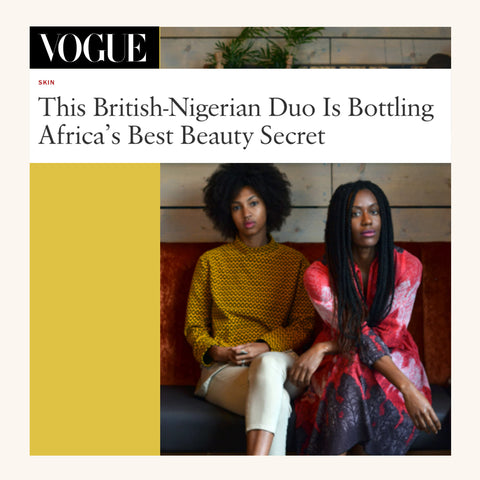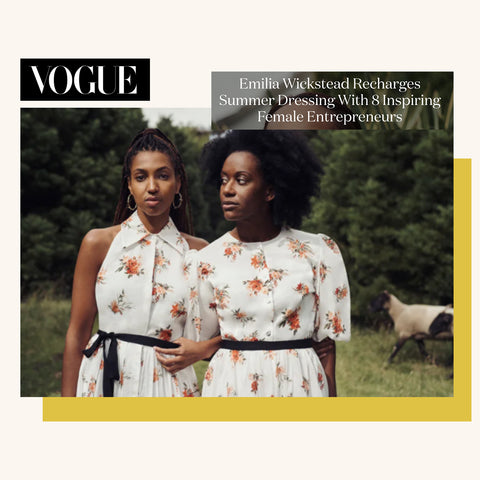When I was younger, my Greek grandmother used to slather my hair in locally pressed olive oil, clean my face with fresh rosewater and present me with mud masks she'd whipped up using the mineral-rich red soil that grew watermelons in the field next to her little island lodge.
As a born and bred Londoner, beauty and my ethnic identity went hand in hand. Even today, my current routine is inspired by those inherited beauty rituals – and I'm not the only one.
From Liha and Abi who launched African-English beauty brand LIHA, to Elena and Inna at Cypriot skincare brand Kypwell, we're seeing more and more beauty empires built upon the skin, hair and makeup traditions reminiscent of their founders' cultural backgrounds. Ingredients and practices are no longer confined to family circles. Now, everyone gets a slice of the beauty pie.
Click through to discover your new go-tos.

University friends Liha Okunniwa and Abi Oyepitan founded LIHA – a 100% vegan, cruelty-free beauty brand with "African roots and a quintessentially British attitude" – in 2015.
"We launched LIHA because we realised that so many people in the natural skincare community had no idea what shea butter was," says LIHA Beauty cofounder, Liha Okunniwa. "We wanted to educate people about how wonderful shea butter is for your skin and how easy it is to use. We're trying to go somewhere with this for the culture."
So what sets it apart from other brands? Well, the sustainable, homegrown ingredients are a good place to start.
"The formulas, first and foremost," says Liha. "The mix of African and English ingredients makes a really unique offering and radiates an unexpected luxury. Everything is made in small batches in Cheltenham and Hackney but shea butter is known as 'Women’s Gold' in west Africa because it has helped so many women gain independence through the co-operatives – we know them well. We wanted to be a go-to sustainable source, and also to bring the Nigerian shea to market. It's waxier and smells much earthier compared to the more common Ghanaian version.
"Ingredients are organic as the trees need no irrigation whatsoever – they just grow naturally, and as the nuts fall, the women process the goodness. For the Ose Gidi (black soap) in the line, we choose crops that will grow as we do. Our goal is to one day have a farm in west Africa with our own co-operatives, where everything we grow will have a benefit socially, environmentally and even politically. For example, molasses creates a waste material that can be used as a biofuel, and moringa can have astounding effects on food poverty."
The key to the brand's success also lies in its Instagram-worthy aesthetic. In fact, you've probably seen the pretty, flower-infused glass bottles in many a #shelfie.
"The design inspiration comes from my father," says Liha. He became a strict minimalist after hitchhiking through Sweden in the '60s, so growing up, our house was always empty, save for a few touches of Yoruba culture. He is an endless inspiration for us. We added the Queen Idia head to our candle design because we wanted to celebrate the pre-colonial matriarchal societies in our culture that are often dismissed as myth by academics."
Despite the minimal aesthetic, looking good is an incredibly important aspect of the Nigerian community, which is how Liha and Abi found their niche.
"We like our skin to glow," Liha says. "Traditionally, it was quite common to learn how to make soap and body products while being taught to cook, so nothing was wasted. We say, this part of shea can be used for food and this part of the coconut can be used for hair. In fact, zero waste has been hot in Nigeria for a long time. That’s where the plantain ash in our Black Soap comes from. It is naturally exfoliating and high in potassium hydroxide. The great thing is that these recipes have been tested for centuries, so when you put this and my interest in hedgerow medicine together, you can’t really lose."
"We launched LIHA because we realised that so many people in the natural skincare community had no idea what shea butter was," says LIHA Beauty cofounder, Liha Okunniwa. "We wanted to educate people about how wonderful shea butter is for your skin and how easy it is to use. We're trying to go somewhere with this for the culture."
So what sets it apart from other brands? Well, the sustainable, homegrown ingredients are a good place to start.
"The formulas, first and foremost," says Liha. "The mix of African and English ingredients makes a really unique offering and radiates an unexpected luxury. Everything is made in small batches in Cheltenham and Hackney but shea butter is known as 'Women’s Gold' in west Africa because it has helped so many women gain independence through the co-operatives – we know them well. We wanted to be a go-to sustainable source, and also to bring the Nigerian shea to market. It's waxier and smells much earthier compared to the more common Ghanaian version.
"Ingredients are organic as the trees need no irrigation whatsoever – they just grow naturally, and as the nuts fall, the women process the goodness. For the Ose Gidi (black soap) in the line, we choose crops that will grow as we do. Our goal is to one day have a farm in west Africa with our own co-operatives, where everything we grow will have a benefit socially, environmentally and even politically. For example, molasses creates a waste material that can be used as a biofuel, and moringa can have astounding effects on food poverty."
The key to the brand's success also lies in its Instagram-worthy aesthetic. In fact, you've probably seen the pretty, flower-infused glass bottles in many a #shelfie.
"The design inspiration comes from my father," says Liha. He became a strict minimalist after hitchhiking through Sweden in the '60s, so growing up, our house was always empty, save for a few touches of Yoruba culture. He is an endless inspiration for us. We added the Queen Idia head to our candle design because we wanted to celebrate the pre-colonial matriarchal societies in our culture that are often dismissed as myth by academics."
Despite the minimal aesthetic, looking good is an incredibly important aspect of the Nigerian community, which is how Liha and Abi found their niche.
"We like our skin to glow," Liha says. "Traditionally, it was quite common to learn how to make soap and body products while being taught to cook, so nothing was wasted. We say, this part of shea can be used for food and this part of the coconut can be used for hair. In fact, zero waste has been hot in Nigeria for a long time. That’s where the plantain ash in our Black Soap comes from. It is naturally exfoliating and high in potassium hydroxide. The great thing is that these recipes have been tested for centuries, so when you put this and my interest in hedgerow medicine together, you can’t really lose."




